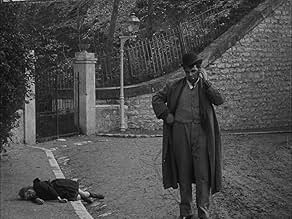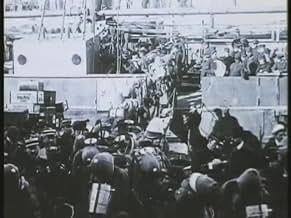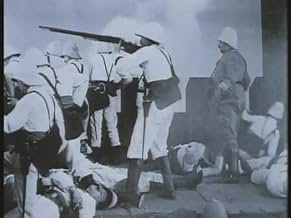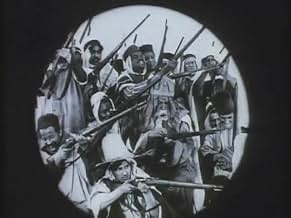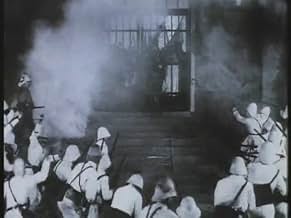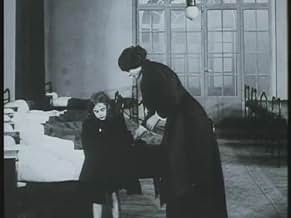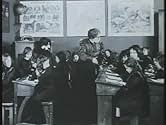NOTE IMDb
7,2/10
491
MA NOTE
La jeune fille d'un capitaine de l'armée porté disparu au combat s'échappe de l'école et est kidnappée par de petits voyous parisiens. Lorsque le ravisseur s'enfuit à Nice avec l'enfant, l'e... Tout lireLa jeune fille d'un capitaine de l'armée porté disparu au combat s'échappe de l'école et est kidnappée par de petits voyous parisiens. Lorsque le ravisseur s'enfuit à Nice avec l'enfant, l'employé au bon coeur d'un de ses complices part à leur poursuite.La jeune fille d'un capitaine de l'armée porté disparu au combat s'échappe de l'école et est kidnappée par de petits voyous parisiens. Lorsque le ravisseur s'enfuit à Nice avec l'enfant, l'employé au bon coeur d'un de ses complices part à leur poursuite.
- Réalisation
- Scénario
- Casting principal
Henri Duval
- Jacques de Valen
- (as Henry Duval)
Avis à la une
What a shame that the films of Leonce Perret are so little known in the United States! Having just seen a crisply restored version of "L'enfant de Paris" (The Child of Paris), I am now eager to see more Perret films. The Kino version of "L'enfant de Paris", at 16 frames per second, runs just over two hours long, and is captivating from beginning to end.
The story centers around a young girl who suffers the loss of both parents. Coming from a family of means, the little girl is sent to an exclusive, but strict, boarding school. After a few unhappy experiences at the school, the girl escapes, only to land in the care of a dangerous thief and a drunken cobbler. A young hunchback who works for the cobbler (young Bosco) befriends the little girl and shows her some much-needed compassion. With amazing delicacy, the story begins to focus as much on Bosco as the little girl - two children of Paris, two outcasts.
The film is epic. Many scenes were shot on location in Paris and Nice. These cities, from a century ago, are fascinating enough, but the direction by Perret is outstanding. He employs low angle and high angle shots, tracking shots and moody back lighting. Some scenes are surprisingly tense; others are wonderfully tender. The story is constructed with sophistication. The acting is generally quite subdued and realistic - very palatable for our modern tastes.
You may think that a pre-WWI film with somewhat Dickensian characters and child protagonist would be too melodramatic to be enjoyable. I found the opposite to be true; I loved this exciting early-twentieth-century slice of life. Even though this is a very old movie, I enjoyed this as much as any contemporary feature length film. If you've sampled some silent cinema and are interested in seeing another high-quality example, check out "L'enfant de Paris" on the Gaumont Treasures DVD from Kino.
The story centers around a young girl who suffers the loss of both parents. Coming from a family of means, the little girl is sent to an exclusive, but strict, boarding school. After a few unhappy experiences at the school, the girl escapes, only to land in the care of a dangerous thief and a drunken cobbler. A young hunchback who works for the cobbler (young Bosco) befriends the little girl and shows her some much-needed compassion. With amazing delicacy, the story begins to focus as much on Bosco as the little girl - two children of Paris, two outcasts.
The film is epic. Many scenes were shot on location in Paris and Nice. These cities, from a century ago, are fascinating enough, but the direction by Perret is outstanding. He employs low angle and high angle shots, tracking shots and moody back lighting. Some scenes are surprisingly tense; others are wonderfully tender. The story is constructed with sophistication. The acting is generally quite subdued and realistic - very palatable for our modern tastes.
You may think that a pre-WWI film with somewhat Dickensian characters and child protagonist would be too melodramatic to be enjoyable. I found the opposite to be true; I loved this exciting early-twentieth-century slice of life. Even though this is a very old movie, I enjoyed this as much as any contemporary feature length film. If you've sampled some silent cinema and are interested in seeing another high-quality example, check out "L'enfant de Paris" on the Gaumont Treasures DVD from Kino.
I first heard of this film in an interview thirty years ago with Edward Gory (imdb is trying to correct my spelling, that should be g-o-r-e-y), and it's hard to imagine a more perfect audience for this movie, with its tale of an innocent little girl who loses her parents (one in war, the other to the usual collapse Victorian wives succumb to) and winds up in the hands of scoundrels, only to acquire a purehearted protector in their ranks. (He is, in a nod to Hugo, a slight hunchback.)
The unspooling of this melodrama is hypnotic, in Perret's clear-eyed and skillful telling; even so well-crafted an American film as Traffic in Souls from the same year seems remote and unsteady compared to the clean, perfectly efficient visuals and editing here. That said, it is a modest disappointment that the little girl-- a charmingly capable miniature Bernhardt, able to pull off every Victorian stage gesture never seen in real children-- becomes little more than a prop over time; her plight is never milked for the emotional effect it could have. If there's an apparent flaw in Perret's work-- comparing it not to other 1913 films but to the later teens films it seems the peer of-- it's that he doesn't seem as interested in his actors as you'd like him to be. They're all obviously skilled, and play their types perfectly to type, and he shoots them in medium shot so we can actually see their faces; but there's no reason for a movie called The Child of Paris to be decorous in its playing-- it ought to pull out all the stops and jerk tears like Griffith a few years later. What starts as a serial seems to end as a neatly solved puzzle.
Still, Kino's release of this film in its Gaumont set is an enormously important release that does some serious rewriting of the standard film history.
The unspooling of this melodrama is hypnotic, in Perret's clear-eyed and skillful telling; even so well-crafted an American film as Traffic in Souls from the same year seems remote and unsteady compared to the clean, perfectly efficient visuals and editing here. That said, it is a modest disappointment that the little girl-- a charmingly capable miniature Bernhardt, able to pull off every Victorian stage gesture never seen in real children-- becomes little more than a prop over time; her plight is never milked for the emotional effect it could have. If there's an apparent flaw in Perret's work-- comparing it not to other 1913 films but to the later teens films it seems the peer of-- it's that he doesn't seem as interested in his actors as you'd like him to be. They're all obviously skilled, and play their types perfectly to type, and he shoots them in medium shot so we can actually see their faces; but there's no reason for a movie called The Child of Paris to be decorous in its playing-- it ought to pull out all the stops and jerk tears like Griffith a few years later. What starts as a serial seems to end as a neatly solved puzzle.
Still, Kino's release of this film in its Gaumont set is an enormously important release that does some serious rewriting of the standard film history.
Poor little Marie-Louise! ( Frau Suzanne le Bret ); she is a little child of Paris who once had a happy and bourgeoisie family but due to some misadventures of destiny, her beloved father, Herr Pierre de Valen ( Herr Émile Keppens ) must leave his home in order to make war against some exotic enemies of France beyond the sea. Due to the fact that in olden days communications were rather slow (carrier pigeons could take years) Marie Louise's father was given up for dead. Marie Louise's mother, broken by grief, dies soon after, leaving poor Marie Louise alone and an orphan.
She is sent to a strict boarding school but, being French, doesn't like the discipline. She escapes only to fall into the clutches of a crook known as "The Graduate" ( Herr Louis Leubas ) who gives her to a drunken cobbler. Happily the soused shoemaker has a young and merciful assistant, Bosco ( Herr Maurice Lagrenée ) who will be her protector.
Unexpectedly one day awesome news arrives in France: Marie-Louise's father has been found alive after so many years!! He receives honors as a war hero but his first task is to find Marie-Louise. The Graduate tells him he will deliver the child for a sum but, after receiving the money from the little girl's father, he takes her and runs off. Herr Pierre de Valen and Bosco go in pursuit.
The film "L'Enfant De Paris" (1913) by Herr Léonce Perret is influenced by what the French call "Roman Feuilleton", those serial stories published in newspapers in France during the XIX century that were very popular among commoner readers. In English terms these could be defined as "Victorian melodramas". Usually these stories involved upper class characters finding themselves in the slums.
These melodramas could thus be seen as bringing social contrasts and class struggle to the surface. "L'Enfant De Paris" has such characteristics but Herr Perret uses the conventions of such stories in an exquisite and very cinematic manner.
The sorrows and miseries of our little heroine are depicted carefully during the two hours of the film (an unusually long running time in such early days ), from her comfortably bourgeoisie life to the underworld. This make for a shocking contrast: We see a society in class crisis (economic success for some, misery, poverty and alcoholism for others). Herr Perret creates the perfect atmosphere for a true "Roman Feuilleton" but he avoids excessive sentimentality thus making the little heroine's reunion with her father all the more touching "L'Enfant De Paris" (1913) is an astonishing film wherein all Herr Léonce Perret's virtues as an early skillful director can be seen at their height, an exemplary oeuvre full of inventive narrative resources and techniques that certainly were ahead of their time.
And now, if you'll allow me, I must temporarily take my leave because this German Count must find a niece who was lost some years ago during a visit to the Schloss.
Herr Graf Ferdinand Von Galitzien http://ferdinandvongalitzien.blogspot.com
She is sent to a strict boarding school but, being French, doesn't like the discipline. She escapes only to fall into the clutches of a crook known as "The Graduate" ( Herr Louis Leubas ) who gives her to a drunken cobbler. Happily the soused shoemaker has a young and merciful assistant, Bosco ( Herr Maurice Lagrenée ) who will be her protector.
Unexpectedly one day awesome news arrives in France: Marie-Louise's father has been found alive after so many years!! He receives honors as a war hero but his first task is to find Marie-Louise. The Graduate tells him he will deliver the child for a sum but, after receiving the money from the little girl's father, he takes her and runs off. Herr Pierre de Valen and Bosco go in pursuit.
The film "L'Enfant De Paris" (1913) by Herr Léonce Perret is influenced by what the French call "Roman Feuilleton", those serial stories published in newspapers in France during the XIX century that were very popular among commoner readers. In English terms these could be defined as "Victorian melodramas". Usually these stories involved upper class characters finding themselves in the slums.
These melodramas could thus be seen as bringing social contrasts and class struggle to the surface. "L'Enfant De Paris" has such characteristics but Herr Perret uses the conventions of such stories in an exquisite and very cinematic manner.
The sorrows and miseries of our little heroine are depicted carefully during the two hours of the film (an unusually long running time in such early days ), from her comfortably bourgeoisie life to the underworld. This make for a shocking contrast: We see a society in class crisis (economic success for some, misery, poverty and alcoholism for others). Herr Perret creates the perfect atmosphere for a true "Roman Feuilleton" but he avoids excessive sentimentality thus making the little heroine's reunion with her father all the more touching "L'Enfant De Paris" (1913) is an astonishing film wherein all Herr Léonce Perret's virtues as an early skillful director can be seen at their height, an exemplary oeuvre full of inventive narrative resources and techniques that certainly were ahead of their time.
And now, if you'll allow me, I must temporarily take my leave because this German Count must find a niece who was lost some years ago during a visit to the Schloss.
Herr Graf Ferdinand Von Galitzien http://ferdinandvongalitzien.blogspot.com
Leonce Perret is virtually forgotten in France where Feuillade's "Vampires" and "Fantômas " have been recently released on DVD in deluxe box sets;and however I do think that his "Mystères Des Roches De Kador " displayed more originality,more ambition and more modernity than the whole far-fetched Irma Vep and co's interminable story : psychonanalysis and a deja vu experience were not that much common in 1912 French cinema.
"L'Enfant De Paris" is pure melodrama ;its screenplay was influenced by the classics of French melodramatic literature from the nineteenth century : "Les Mystères De Paris " ," La Porteuse De Pain" or "Les Deux Orphelines " which DW Griffith transferred to the screen as "orphans of the storm" ;the latter (the novel) did inspire Perret's screenplay too : the drunk brute is an equivalent of La Frochard and Bosco plays more or less the role of her good son.
That said ,and mainly in its first part ,"L 'Enfant De Paris"has stood the test of time triumphantly :the first part is dense ,eventful and features lots of great scenes ,still impressive today:
-Happiness time, the ending of which is masterfully conducted ,when the score segued from the old French folk song " Sous Le Pont D'Avignon" into a military dirge .
-the depiction of the boarding-school , the lugubrious dormitory , the girl deprived of her only friend, her doll, her mates making her their punching bag (the scene of their faces in the classroom is extraordinary)
-the drunkard ,some kind of Hugo's Thénardier who treats the little girl like a slut ,a Cosette who's refused a piece of bread.
-the relationship with hunchback Bosco ,himself in search of love,tenderness and affection.
Things deteriorate a little in the second part during Bosco's investigation:as a critic noticed , Perret has not got a sense of the "meanwhile" ,and the desperate daddy and good housekeeper Marion completely disappear from the screen ;Bosco 's visit of the Carmen villa drags on whereas there was never a dull moment in the first half .One should notice,however, that Perret was one of the first artists to take the cinema out of the studios ,and some scenes were filmed on location in Nice (and even on the Champ De Mars at the beginning) ;and there are great moments such as that of the ladies in their barouche ("I'm no beggar!)or that of the restaurateur who drives the hunchback out of his place .
That this movie should be ignored in its native France is really disgraceful.
"L'Enfant De Paris" is pure melodrama ;its screenplay was influenced by the classics of French melodramatic literature from the nineteenth century : "Les Mystères De Paris " ," La Porteuse De Pain" or "Les Deux Orphelines " which DW Griffith transferred to the screen as "orphans of the storm" ;the latter (the novel) did inspire Perret's screenplay too : the drunk brute is an equivalent of La Frochard and Bosco plays more or less the role of her good son.
That said ,and mainly in its first part ,"L 'Enfant De Paris"has stood the test of time triumphantly :the first part is dense ,eventful and features lots of great scenes ,still impressive today:
-Happiness time, the ending of which is masterfully conducted ,when the score segued from the old French folk song " Sous Le Pont D'Avignon" into a military dirge .
-the depiction of the boarding-school , the lugubrious dormitory , the girl deprived of her only friend, her doll, her mates making her their punching bag (the scene of their faces in the classroom is extraordinary)
-the drunkard ,some kind of Hugo's Thénardier who treats the little girl like a slut ,a Cosette who's refused a piece of bread.
-the relationship with hunchback Bosco ,himself in search of love,tenderness and affection.
Things deteriorate a little in the second part during Bosco's investigation:as a critic noticed , Perret has not got a sense of the "meanwhile" ,and the desperate daddy and good housekeeper Marion completely disappear from the screen ;Bosco 's visit of the Carmen villa drags on whereas there was never a dull moment in the first half .One should notice,however, that Perret was one of the first artists to take the cinema out of the studios ,and some scenes were filmed on location in Nice (and even on the Champ De Mars at the beginning) ;and there are great moments such as that of the ladies in their barouche ("I'm no beggar!)or that of the restaurateur who drives the hunchback out of his place .
That this movie should be ignored in its native France is really disgraceful.
The Child of Paris is the one feature included on Kino's early film collection Gaumont Treasures. This Dickensian story follows a young girl from a privileged background who becomes separated from her family. First, she is placed in a boarding school and then later falls into the hands of a drunk cobbler and the leader of a band of thieves. Our heroine has one friend, Bosco the cobbler's assistant. The film is not as melodramatic as it could have been. For instance, no one at the boarding school is physically abusive to the young girl. It is probably even a good school, just not for a depressed child who thinks she has lost everything.
The Child of Paris was made two years before Birth of a Nation. My knowledge of features from that era is limited, making a fair assessment of The Child of Paris difficult. I have watched Cabiria (made a year later) and remember it fondly. I have also watched The Last Days of Pompeii (also made in 1913) and found that film a struggle to finish. Otherwise, my frame of reference for pre-Birth films is limited to shorts. All that aside, I would still wager that this film was ahead of its time. There are a handful of wonderful moments (the escape from the boarding school; the returning hero saluting the crowd as his heart is breaking; and Bosco on a hilltop framed against a glittering sea in Nice). All of these make this film memorable.
On a personal note, I found the film somewhat prolonged at 124 minutes. The story appears to end at about the halfway point but then the villain gets away with the girl at the last moment. The second half focuses on Bosco, the little heroine's one friend, trying to save her. The film gets a little bogged down in scenes of Bosco in Nice (despite some wonderful scenery).
The Child of Paris is a good film and of historical importance. Kino deserves much thanks for rescuing this title. However, although I liked the film, my enthusiasm is not as strong as the other reviewers.
The Child of Paris was made two years before Birth of a Nation. My knowledge of features from that era is limited, making a fair assessment of The Child of Paris difficult. I have watched Cabiria (made a year later) and remember it fondly. I have also watched The Last Days of Pompeii (also made in 1913) and found that film a struggle to finish. Otherwise, my frame of reference for pre-Birth films is limited to shorts. All that aside, I would still wager that this film was ahead of its time. There are a handful of wonderful moments (the escape from the boarding school; the returning hero saluting the crowd as his heart is breaking; and Bosco on a hilltop framed against a glittering sea in Nice). All of these make this film memorable.
On a personal note, I found the film somewhat prolonged at 124 minutes. The story appears to end at about the halfway point but then the villain gets away with the girl at the last moment. The second half focuses on Bosco, the little heroine's one friend, trying to save her. The film gets a little bogged down in scenes of Bosco in Nice (despite some wonderful scenery).
The Child of Paris is a good film and of historical importance. Kino deserves much thanks for rescuing this title. However, although I liked the film, my enthusiasm is not as strong as the other reviewers.
Le saviez-vous
- Gaffesit is suggested that the kidnapper went to a casino in Nice to gamble with the ransom money. However, as the captain was released almost as soon as he had been imprisoned, he would surely have cancelled his cheques for the ransom money, which is the reason the kidnapper gave for tying him up.
Meilleurs choix
Connectez-vous pour évaluer et suivre la liste de favoris afin de recevoir des recommandations personnalisées
Détails
- Durée
- 2h 4min(124 min)
- Couleur
- Mixage
- Rapport de forme
- 1.33 : 1
Contribuer à cette page
Suggérer une modification ou ajouter du contenu manquant

